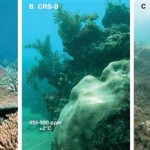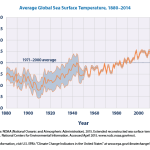 Anthropogenic climate change has been hypothesized for centuries (discussed in Le Treut 2007) before the careful measurements of scientists in the mid-20th century. From 1833 to 1997, Stanhill (2001) calculated that the climate change science doubled every 11 years. The impact of carbon dioxide concentrations in the ocean was recognized early on with measurements and analyses taken by Revelle and Suess (1957). While research on ocean acidification has made great strides in the last two decades (reviewed in Doney et al. 2009), the surface has barely been scratched with understanding how lower pH affects the already downtrodden commercial fisheries that serve as the foundation of many livelihoods and economies.
Anthropogenic climate change has been hypothesized for centuries (discussed in Le Treut 2007) before the careful measurements of scientists in the mid-20th century. From 1833 to 1997, Stanhill (2001) calculated that the climate change science doubled every 11 years. The impact of carbon dioxide concentrations in the ocean was recognized early on with measurements and analyses taken by Revelle and Suess (1957). While research on ocean acidification has made great strides in the last two decades (reviewed in Doney et al. 2009), the surface has barely been scratched with understanding how lower pH affects the already downtrodden commercial fisheries that serve as the foundation of many livelihoods and economies.
Commercial fisheries have worn the brunt of excess and experiments in regulations for several decades. Many fishing quotas are set using recent historical catch data and based on a maximum sustainable yield. The commercial fishing industry has much to be concerned about. Reduced yields will devastate livelihoods and jobs in areas where fishing is the only, or by far the largest, industry. Subsidence fishing, typical in impoverished areas, will be threatened and inhabitants will need to procure new sources of protein.
Much of the current research has focused on animals with carbonate skeletons. Acidic oceans will degrade molluscan shells, making them particularly susceptible as larvae and as adults to mortality. Corals provide habitat for many commercial stocks of finfish, with nearly 10% of worldwide landings coming from reefs (Carpenter et al. 2008). Deep-sea coral reefs in cold, dark waters support juvenile commercial finfish stocks, such as roughy and codling (Hall-Spencer et al. 2002, Rogers 1999). Furthermore, larval and adult fish and marine mammals who rely on planktonic food sources will be nutrient limited if their prey have difficulty adapting to changing pH.
One area that will need particular attention is the physiological effects on already overfished commercial stocks. Preliminary experiments in cod suggest they are able to adjust enzyme levels, with motor control unaffected, to cope with the 2000 ppm levels of carbon dioxide projected not too far into the future (Meizner et al. 2008). Larval fish are likely to be more susceptible to changes in pH as they are less protected from changes in the environment, expend lots of energy for physiological processes, and experience high natural mortality. Lower ocean pH makes acid-base regulation more difficult since diffusion plays a stronger role than in adults where active ion-transport accounts for the majority of physiology.
Much research is needed, particularly with larval fish and invertebrates, to understand what lower pH means to their physiology, growth and survival. Commercial fisheries and consumers will need to adjust their seafood-consumption lifestyles to accommodate lower sustainable yields. The socioeconomics of reduced fishing capacity needs to be addressed at a global scale. I fear that fisheries will be attacked synergistically by all these forces – climate and fishing pressure – and hope people smarter than I can come up with tenable solutions.
It is likely not all doom and gloom. We humans have a remarkable ability to adapt when the will is strong. The sooner we address the changes that need to take place, the better off the ecology of the oceans are, the better off fishermen and their livelihoods and culture are, and the better off seafood consumers are. My plea is not merely for more research in ocean acidification and its effects on fisheries, but an integrative approach that accounts for our consumptive lifestyle.
![]() References:
References:
Carpenter KE, Abrar M, Aeby G, Aronson RB, Banks S, Bruckner A, Chiriboga A, Cortés J, Delbeek JC, Devantier L, Edgar GJ, Edwards AJ, Fenner D, Guzmán HM, Hoeksema BW, Hodgson G, Johan O, Licuanan WY, Livingstone SR, Lovell ER, Moore JA, Obura DO, Ochavillo D, Polidoro BA, Precht WF, Quibilan MC, Reboton C, Richards ZT, Rogers AD, Sanciangco J, Sheppard A, Sheppard C, Smith J, Stuart S, Turak E, Veron JE, Wallace C, Weil E, & Wood E (2008). One-third of reef-building corals face elevated extinction risk from climate change and local impacts. Science (New York, N.Y.), 321 (5888), 560-3 PMID: 18653892
Doney SC, Fabry VJ, Feely RA, & Kleypas JA (2009). Ocean acidification: the other CO2 problem. Annual review of marine science, 1, 169-92 PMID: 21141034
Hall-Spencer J, Allain V, & Fosså JH (2002). Trawling damage to Northeast Atlantic ancient coral reefs. Proceedings. Biological sciences / The Royal Society, 269 (1490), 507-11 PMID: 11886643
Le Treut H, Somerville R, Cubasch U, Ding Y, Mauritzen C, Mokssit A, Peterson T, Prather M (2007) Historical Overview of Climate Change. In: Solomon S, Qin D, Manning M, Chen Z, Maruis M, Averyt K, Tignor M, Miller H (eds) Climate Change 2007: The Physical Science Basis. Contribution of Working Group I to the Fourth Assessment Report of the Intergovernmental Panel on Climate Change. Cambridge University Press, Cambridge, UK and New York, NY, pp 94-127.
Melzner F, Göbel S, Langenbuch M, Gutowska MA, Pörtner HO, & Lucassen M (2009). Swimming performance in Atlantic Cod (Gadus morhua) following long-term (4-12 months) acclimation to elevated seawater P(CO2). Aquatic toxicology, 92 (1), 30-7 PMID: 19223084
Revelle R, Suess HE (1957) Carbon Dioxide Exchange Between Atmosphere and Ocean and the Question of an Increase of Atmospheric CO2 during the Past Decades. Tellus 9:18-27.
Rogers A (1999) The biology of Lophelia pertusa (Linnaeus 1758) and other deep-water reef-forming corals and impacts from human activities. International Review of Hydrobiology 84:315-406.
Stanhill G (2001) The growth of climate change science: a scientometric study. Climatic Change 48:515-524.
Share the post "From the Editor’s Desk: The Grand Challenge of Ocean Acidification and Fisheries"






Thanks, Kevin. It’s this sentence — “We humans have a remarkable ability to adapt when the will is strong.” — that concerns me, given the completely dysfunctional actions of the U.S. government over the last ten years regarding science in general and climate change in particular.
That’s because its an uphill battle of the will of a few against the complacency of a multitude. This was why I picked fisheries, in part, to discuss. It affects people’s wallets, it affects an industry and jobs, it affects people’s health, and it affects a livelihood that bring some people that aren’t living in fishing communities a nostalgia that may resonate with them emotionally. We need to hammer in the applied nature of science. Science is their to serve, not just enlighten, society. I am unsure if this strategy will reach out to more people who otherwise may be disinterested in ocean acidification, but I am willing to try a variety of strategies to maximize my reach, as I hope all scientists would be willing to do.
Sorry Kevin, this is just a sales pitch. I can see through this as clear as my reading glasses. You seem to be part of the plethora of new “scientists” vying for grant money and purpose; jumping on the band wagon of social engineering and replacing all known religions with the religion of science and environmentalism.
I will avoid insulting commentary of your article that is nothing more than sales pitch full of holes and propaganda, then designed to look as if it is a research paper, not and editorial.
The fishing fleet has been decreased by 50% since the 90’s. Today, the Catch & Trade scam has reduced the fleet by another 50%.
Your overfishing claim reduces your credibility.
Did you read the article? I have no clue what you are talking about. Sales pitch for what? I am discussing an area I feel needs further research. I have no horse in this game. I do not even do climate change research, ocean acidification research, or fisheries research. I am not an environmentalist either, I teach and conduct research in evolutionary ecology. What is social engineering even?? You clearly haven’t a clue what you are talking about and resorting to insulting me without any reasons.
So I take it that you feel increasing pH in the ocean and fishing pressure do not act in concert to put stress on fish populations? This is not worthy of future study? Its OK if you disagree but please the douchebaggery at home.
Sir/Ma’am, you can’t through numbers around without any context. Whose fishing fleet? Tuna fleet? US fleet?
Catch & Trade scam? I’m sorry, but I’m not familiar with this jargon.
My overfishing claim is indisputable for a wide variety of fisheries. Now, I’ll be honest that I did not specify a particular species of country’s fishery, but the point of this post was that we need to do more research in the area of how fished species are coping with the additive stress of lower pH and fishing pressure. I am arguing for nothing more than more research. As I said to the other gentleman, I have no horse in the game, I view as a next step in research. You are free to disagree, but coming into my saloon with your pistols already cocked while missing the point does little for you’re own credibility.
You are taking null hypotheses and regarding them as empirical data.
Fish landings are being used as an alarm to scare the ignorant public into thinking all species are “over-fished.” This is the main flaw in precautionary management; the “scam.” The true cause for lower fish catch is the decrease in fishing and the increase in regulations. These being proven by the number and age of fishermen and number of landings. Most of the data you reference is from model theories, not baseline studies.
As for your posting in general, you have “cherry picked” data to represent an idealistic agenda in a fictionary tale, leading the layman to think this is cited and peer reviewed(deceptive).
Your last paragraph is the “bow on the package.” Pure mindbending propaganda.
As for your questions, No, I do not. You are putting the cart before the horse. You are using model theory as if it has already happened. “Fishing pressure” is out of context since the alarm of overfishing is false (in most cases).
If you are not an agent of anti-human progressives, I would be happy to show you where you are wrong, with real peer reviewed papers from some on the other side of this debate; such as Prof. Ray Hilborn, U. Wash. fisheries expert. However, if you are, you will dismiss this as more “douchbaggery” and continue the charade.
Call me any time, bro. I’ll show you the error of the data you are using and how and why. In fact, we have just written a book on this very subject. And, understand this is not a personal attack, it is an attack on false data.
Regards, [email protected]
Hey Kev, If you haven’t noticed, your article is in the #1 spot on google news. Expect confrontations when you project your opinion in a public forum.
Personally, I thought I was being rather gentle considering the implications of your statements. It might not be a good idea to fuse fishing with “scientific study” due to the fact that there are some of us in the fishing industry that know the truth and have the data to back it up.
Good Luck in the future, congrats for your SEO positioning ;)
Ok, so I was just scanning your stuff. You know exactly what’s up…
https://www.deepseanews.com/2010/12/from-the-editor%E2%80%99s-desk-benefits-of-bottom-trawling-and-other-assorted-fairy-tales/
Take away the the subject of bottom trawling and you have exactly what I have said to you, but from a different perspective (I am against bottom trawling, by the way). There are those who are resting on the laurels of junk science and practice misplacement of context. There are simply too many scientists and it is a feeding frenzy on a baitball of grants, agendas and ideals. What happened to science for knowledge?
“Science is the belief that the experts don’t know everything.”
Kevin, Northeast groundfishing fleet. Your catch share propaganda opinion showed lack of facts & lots of speculation. As in Wall St. Catch Shares is privatization of public resources. https://www.deepseanews.com/2009/09/catch-shares/
I LOLed
Are you familiar with the concept of “catch per unit effort?”
This is just like climate deniers piling on whatever comes up their google news alert with stock answers. Glad they could show up to a reasonably written post and claim that the solution is more fishing.
Weather it is Paul Watson’s eco-terror campaigns, Green Peace mob tacticts or Ocean Acidification-marine science has one goal: to grow their own glory/funding while relegating humans to a confined existence.
The marine science gang routinely uses brain washing to bed the mind of anybody who will listen and further sues “facilitation” to manipulate public meeting to make ti seems as if the process is democratic- trusting a marine science person makes as much sense as nursing a cobra back to health, letting it in your bed and hoping that it does not sink its fangs into to.
Ocean acidification is bases on modeling only-there is no hard evidence- it is a scam all the way-
Long live a free ocean!
JN
Full of holes, propaganda and carefully cited scientific research ;)
Wow. Comment strings can be very…educational.
I don’t have time to wade through everything here, but this is worth pointing out: the alteration of the carbonate system in seawater is not simply based on models. For example, the Hawaiian Ocean Time-Series (a specific station that has been continuously studied for the past 20 years) has shown a decline in carbonate ions and an increase in pCO2, leading to lower calcium carbonate saturation states (quite drastically for aragonitic species, such as shallow corals). This trend has been validated through observations such as these.
NOAA has a nice explanation as to why this is occurring and some of the basic chemistry here: http://coralreefwatch.noaa.gov/satellite/oa/description/oaps_intro_oa.html
Yep.
Fishing down the web is still in debate and as of recent is leaning towards lack of merit. Hence the practice of “precautionary Management.” This is the BIG question, what is the biomass? Until this is a known, all of these theories have no baseline.
Look guys, we fishermen in the US have the most draconian regulations in the world. You may be surprised that most of these regs are supported by fishermen. Here in my fishery, we impose our regs upon ourselves. ‘WE’ have decreased our fishery by 60%(ourselves), seeing and adapting to a changing environment and sustainability requirements. There are cutthroats out there giving responsible and conservative fishermen a real bad name. But just the same as jihadist terrorists, you can’t blame the industry for the ill-doings of a few.
The phrase you all should be researching is “Adaptive Management.”
A case by case holistic evaluation that excludes generalizing and categorizing. It’s not your fault, it’s the way you’ve been taught; and, the source of the alarm bells is from those on a social engineering agenda. Namely, Julie Packard and Jane lubchenco, Rod Fujita, et al. These highjackers of science education and environmentalism are very open about their agenda and their hatred of man. How sure are you that your not a victim of Stockholm syndrome? (ROTFLMAO). When you learn the truth, you’ll always remember this thread. Good luck gentlemen.;P
Well, there’s some kneejerk, conditioned reaction for ya!
I don’t see….no, nope, nobody said anything about a solution being more fishing.
Yer just jivin’ us Jives.
History is full of “chicken littles” bud.
So you would support the following assessment:
“Land managers and scientists will never have a complete knowledge of highly complex and evolving ecosystems where the resource questions continually shift in response to changing public expectations. Given our incomplete knowledge of biological and socioeconomic systems and their interactions, the implementation plan for ecosystem management should be tentative and subject to continual scrutiny. Adaptive management provides an approach to implementing ecosystem management in which subsequent monitoring and redirection opportunities can improve the management of natural and socioeconomic resources.
Adaptive management is a process that allows management to proceed in an uncertain biological and socioeconomic environment, but it requires a continual learning process, a reiterative evaluation of goals and approaches, and redirection based on an increased information base and changing public expectations (Baskerville, 1985). Adaptive management is not an excuse for shoddy management; instead, it requires explicit hypotheses about system structure composition and function, a clear statement of management goals, defined management actions to be implemented, and anticipated ecosystem response(HaIling, 1978; Walters and Holling, 1990).
Adaptive management provides the mechanism to continually adjust our long-term management goals to conserve the resource base and meet future changes in public expectations. Past management did not fail at meeting past management objectives; the failure was that past management objectives did not meet evolving public expectations. Public expectations for National Forest lands changed from watershed protection to livestock grazing to timber production and back to ecosystem management in less than a century; however, forest and aquatic pattern/process response times commonly exceed these quarter century or decadal time frames. The reiterative monitoring strategy of adaptive management is one mechanism that enables land managers and scientists to test their initial knowledge of ecosystems. How well managers can advance and implement that knowledge over time and how well they can redirect management strategies to meet changing public expectations are primary criteria that will be used in determining the success of ecosystem management.”
Which, by the way, was written by a landscape ecologist, the senior ecologist at the Nature Conservancy, and a senior researcher at the EPA, but noticeably not from a representative of commercial fisheries. The full paper is a riveting read: http://onlinelibrary.wiley.com/doi/10.1111/j.1752-1688.1996.tb03445.x/pdf and draws heavily from Lubchenko’s work.
Look, it’s great that you’re supporting this kind of management policy, but it’s frankly bizarre that you’re trying to argue that the people responsible for drafting these concepts are the same ones trying to hijack them. I think you’d rather have some kind of villain to rage against instead of recognizing that we’re all in the same boat, trying to manage things the best we can. I’d make a tilting at windmills joke, but I’m afraid you’d misinterpret that and go off on a tangent about offshore wind farms.
Sorry that I don’t have time to respond to everyone’s comments. I currently have 2 part time jobs and am a full time doctoral student, in addition to volunteering here.
I wrote about ocean acidification research last year at Scientific American’s website: To Catch a Fallen Sea Angel: How a Mighty Mollusc Detects Ocean Acidification
Many of the research papers that I discuss there are direct measurements of ocean pH or CO2 concentrations with experiments on the physiology of various organisms. This article I wrote was about pteropod molluscs who are the most susceptible to changes in ocean acidity and I think my article hopefully convinces you of that. Feel free to comment here about it if you wish, I don’t monitor that thread anymore. Perhaps I need to do a post on how we have experimentally determined that ocean pH is changing rapidly later.
Also I would just like to remind everyone that while I was writing about ocean acidification and fisheries, my thesis was that it should be a priority in research. This should be important irrespective of whether you believe overfishing is occurring or not. I just feel that the original message is getting lost amongst the interesting commentary.
TOUCHE’ Southern Fried!! Very Good!!
This is the problem I face and the research I have been doing for the last 2 years. I would like to show you a draft of the book we are finishing up. Marine science has been highjacked at the university level, this we put in B&W. I might add that it is in their words, not ours. I am an
environmentalist/conservationist and am a study of marine science from the other side of the fence.
“it’s frankly bizarre that you’re trying to argue that the people responsible for drafting these concepts are the same ones trying to hijack them.”
Yes, bizzare, but sadly true. And, no one would expect or accept such claims. Look at it from a science mindset, open minded and study the facts and their own words.
[email protected]
Interesting story, thank you! I work for a nonprofit focused on increasing public understanding on science topics. Our attempt to address current levels of confusion and contention is by combining science expertise with engaging storytelling. We recently completed a test to “crowd source” the creation of videos about ocean acidification. http://bit.ly/ge6owx We’d love some feedback. Thank you!